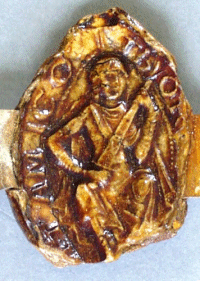Thor Longus

Thor Longus or Thor the Long (fl. c. 1113 x 1124) is an early 12th-century Anglo-Saxon noble associated with Roxburghshire, a culturally English territory ruled by the Scottish king from the 11th-century onwards. A charter dating between 1107x1113 and 1124 claims that Thor the Long founded Ednam, previously a deserted waste granted to him by King Edgar of Scotland.[1]
Ednam lies close to the Northumberland border with Roxburghshire. It states that he repopulated the settlement with his own followers and a church.[1] The charter grants the church to the monks of St Cuthbert.[1] There survives the notice of this grant given by Thor to his lord Earl David (future David I of Scotland), as well as Earl David's confirmation of the same grant.[2]
Thor had a brother named Leofwine, mentioned in Thor's charter as requiring "redemption".[3] Leofwine "the monk" was commemorated in the Martyrology of the Durham Cantor's book for June 2 (day of death), and in the same source Thor Longus was commemorated for May 14.[4] The year of his death and descendants are not known, but Ednam appears in the crown's hand in 1136.[5]
See also
Notes
- 1 2 3 Howlett, Caledonian Craftsmen, pp. 10–11; Lawrie (ed.), Early Scottish Charters, no. 24
- ↑ See Howlett, Caledonian Craftsmen, pp. 10–14 for text, translation and commentary; Lawrie (ed.), Early Scottish Charters, nos. 24, 33, 34
- ↑ Howlett, Caledonian Craftsmen, pp. 10–11; Lawrie (ed.), Early Scottish Charters, p. 259, suggests he had been a prisoner in the Crusades
- ↑ Barrow, "Scots in the Durham Liber Vitae", p. 111
- ↑ Lawrie (ed.), Early Scottish Charters, pp. 259–60, and no. 86
References
- Barrow, G. W. S. (2004), "Scots in the Durham Liber Vitae", in Rollason, David, The Durham Liber Vitae and Its Context, Woodbridge: Boydell Press, pp. 109–18, ISBN 1-84383-060-4
- Howlett, David (2005), Caledonian Craftsmanship: The Scottish Latin Tradition, Four Courts Press, ISBN 1-85182-485-5
- Lawrie, Archibald Campbell, ed. (1905), Early Scottish Charters : Prior to A.D. 1153, Glasgow: J. MacLehose and sons